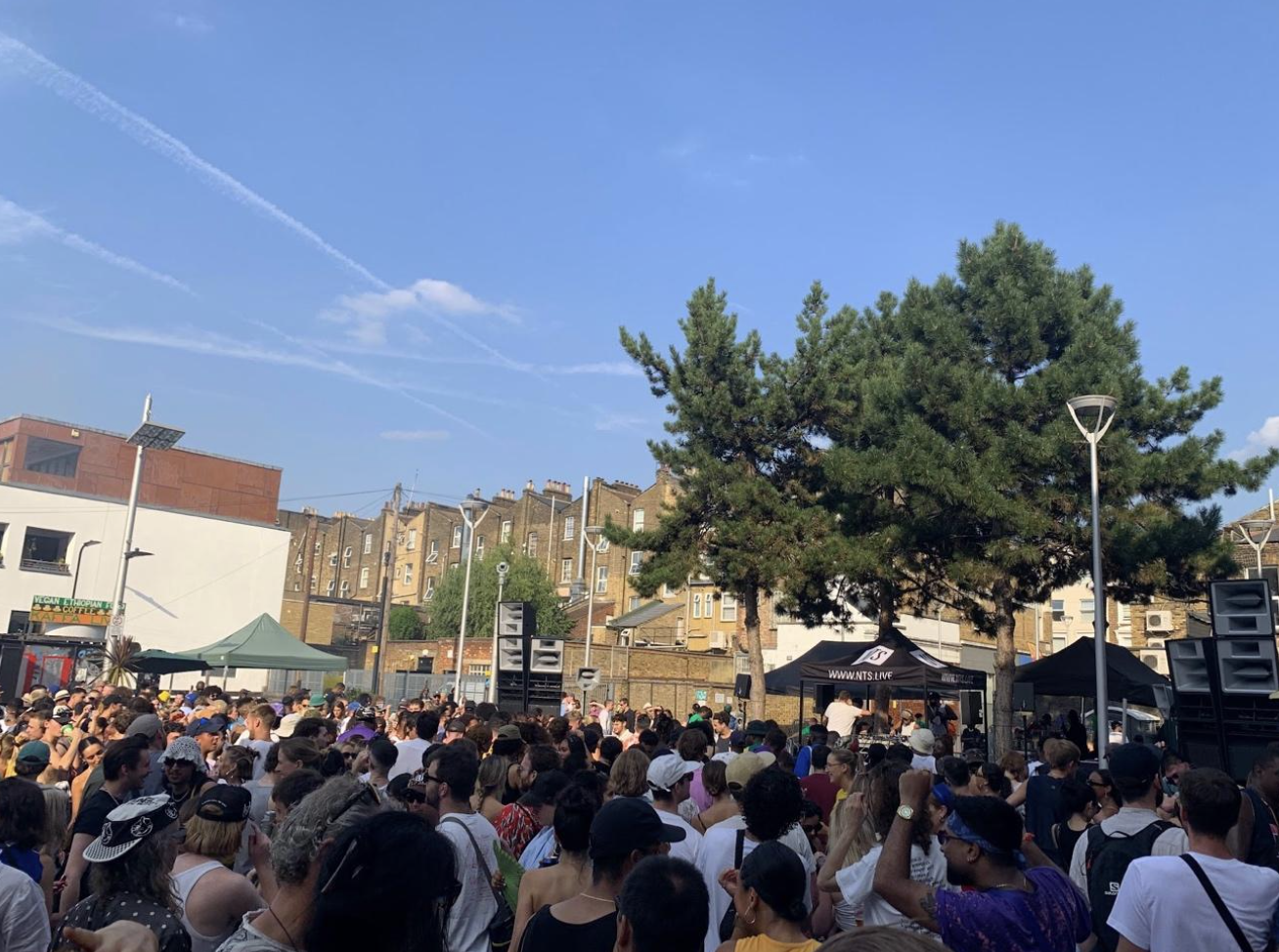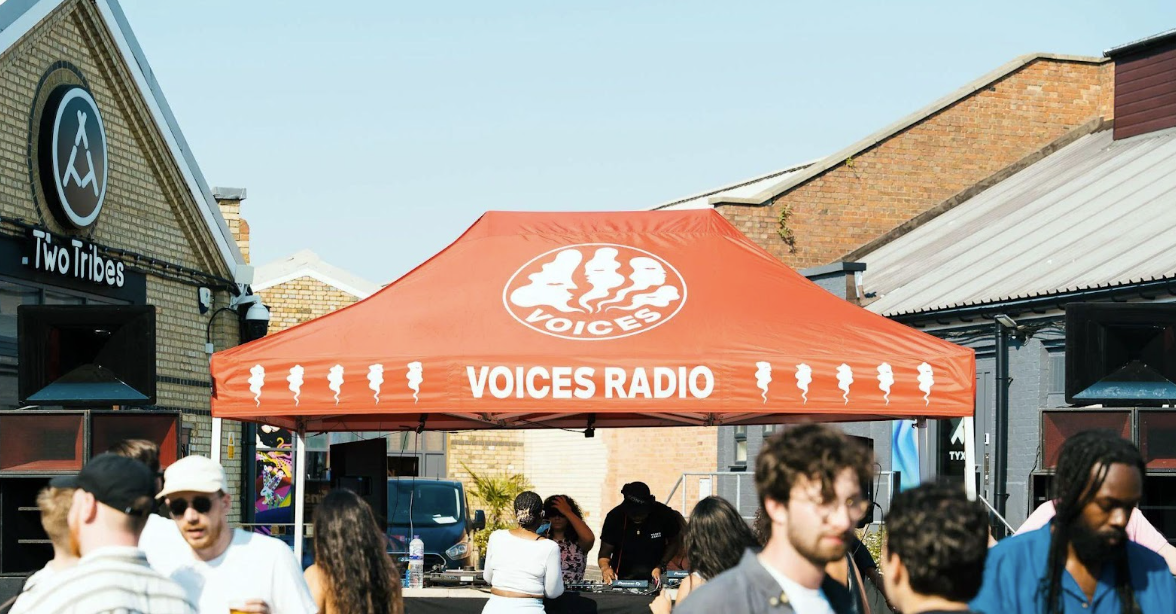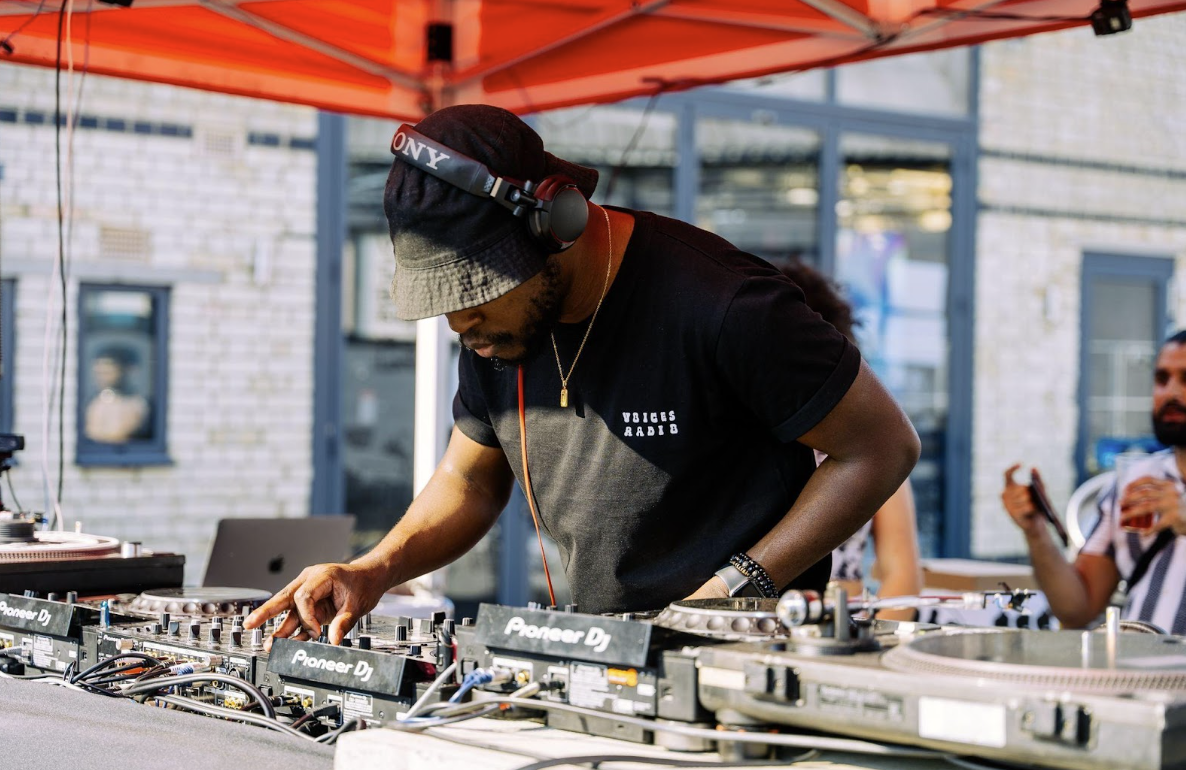
The capital is known for its diverse subcultures, and community-led radio stations are no exception.
Here’s how they are evolving their brands from the grassroots, whilst offering people a pathway into the music industry, writes Lucy Snell.
“Having had a pretty lonely experience growing up, listening to a breakfast radio show was a form of escapism”. Jade Pearson’s love for music transitioned to a love for radio after listening to Nick Grimshaw’s BBC1 Breakfast Show every morning in her teen years. “His relationship with his producers and the show itself was light-hearted, fun and comforting”, she adds. Listening to his program every morning not only brought solace but ignited her passion for radio, which would become her future career.
Now, an assistant producer at KISS FM, she is at the front of what she imagined as a youth: a job in the industry whilst making close bonds with presenters and producers, like the ones she admired on the BBC.
Pearson progressed into the industry as a freelancer. During this time, she worked as a producer at Voices Radio, a Community Radio Station (CRS) based in Kings Cross.
CRSs are small-scale and non-commercial enterprises that rely on council funds, subscription models and brand partnerships to operate on the contrary to larger-scale FM radio stations, which rely on advertisements to turn a profit. CRSs are common pathways to careers in larger-scale stations such as KISS FM, BBC Radio, and Capital FM.
Pearson says that Voices allowed her to make connections within the industry and without them, she wouldn’t be in the position she had today.
“Many of the people I met in the industry were super interested in Voices, which made me stand out, especially because it showed I had an interest in specialist music”, she explains that Voices acted as a springboard into the industry, something that CRS typically aim to achieve.
Community stations run without exhaustive adverts like the ones found on FM, so many CRSs have financial issues. These tensions have led some stations to implicate measures such as reduced broadcasting days and reliance on unpaid staffing or volunteers. In some extreme cases stations have shut down completely.
Despite all the financial turmoil, many stations have remained afloat. NTS Radio first launched in 2011 with a £5,000 budget and a pair of CDJS, broadcasting from their studio in Dalston. Today, 12 years on it boasts a thriving community with an abundance of popularity and monthly listeners. Founders Femi Adeyemi and Sean McAuliffe remain passionate and true to their independent roots. In an interview with MBW: Adeyemi stated, “Not much has changed since day one, except for the scale of things”.

To make money NTS follows a subscription model, runs events, and has had brand partnerships. Robin Loo, Global Partnerships Manager at NTS says: “People pay a small fee every month just because they love the station and support it”. Other smaller and newer studios, like Balamii and Voices Radio, have followed a similar model.
NTS is still a London-based radio station, however with over three million monthly listeners, it is aiming to change perceptions of itself as a community station. The station’s management team, led by Loo, wants to be recognised as a global platform rather than just a local station. Broadcasting from permanent studios in London, Manchester, and Los Angeles, NTS features DJs from over 50 cities worldwide and has 600 show residents.
“There are different roles and scales that each station has. Something like NTS is a global brand, there are millions of monthly listeners. Whereas something like Reprezent Radio is a lot more localised”.
NTS has built a global brand however, it still faces problems with its listenership due to streaming platforms like Spotify and Apple Music.
Despite the shift towards streaming platforms, the morales remain high at NTS. Loo says that even though radio listenership has decreased he believes it will still be prevalent “as long as people remain curious about new music discovery”.
“People want to listen to the radio because the DJs are tastemakers. They are looking at a different pool of songs and feel refreshed as you’re not listening to the same thing over and over”, Loo continues.
NTS strives themselves on having music played by their passionate DJs, not music on algorithms like you find on streaming platforms such as Spotify. They “play exceptional music that is hard to find anywhere else”, says co-founder McAuliffe in a Financial Times article. He states that 50 per cent of their music cannot be found on Spotify.
Adeyemi wanted to create a reflection of all the different tastes in London. He drew inspiration from Pirate Radio stations, according to an article in MBW. Pirate radio first materialised in the UK in the 1960s. This illegal form of broadcasting, whereby stations are without valid licenses, became a popular defiance of the piracy regulations at the dawn of radio. Ofcom reported that in 2009 there were 150 pirate stations in the UK, since then this figure has decreased, due to stricter licencing fines.
Loo explained to me: “Pirate Radio wanted to use the same means as commercial radio but do something different”. Peaking in the 1960s and again in the 1990s, it was the best place to learn about new music, particularly more urban genres. As time passed the stations became more than just the music, listeners would form social circles and attend club nights.
At present, pirate stations have “fizzled out”, Loo says, and now “community radio stations [have] popped up”, but unlike its predecessor, they are perfectly legal and have Performing Rights and PPL (Phonographic Performance Limited) licences that protect them from copyright laws.
London flourishes a great deal of CRSs, new and old. For example: Voices Radio is based in Kings Cross and turned two this year. Their studio is situated in Coal Drops Yard, a new retail development, neighbouring Central Saint Martins. You’ll find the Voices’ vibrant studio tucked between a range of ostentatious yet charming stalls selling whimsical Japanese crockery, pop-up food vendors serving a plethora of international cuisines and a lot of trendy cafés. The live DJ sets blasts music as you approach the studio, not only is it being broadcast to hundreds of loyal listeners via their website, but it is also booming from their speakers and permeating around their premises like an aura pulsating through the airwaves.
There’s an underlying sense of community throughout the whole of Coal Drops Yard and Voices Radio is at the epicentre of it.

Kit Lockey, co-founder and director at Voices Radio based in Kings Cross, explains that finances are a “massive challenge” when running a “community enterprise” as it is not a company that’s “designed to make money”.
Along with their non-profit mantras, many CRS, including Voices, have fostered a determination to act as an accessible entry into the music and media industry. Developing creative spaces has opened the door for many individuals to broaden their experience or land paid work. For example, new DJs can mix their shows whilst broadcasting to an audience and may find DJing gigs within the network the station has created. CRS can also act as a starting point for people aspiring for jobs in the media or music industry to get a foot in the door. For instance, Pearson evolved from producing at Voices to eventually working at KISS FM.
“We’ve had a number of people go into the BBC, KISS FM and other kinds of bigger FM networks where they can get paid a good salary and work professionally in the radio industry”, says Lockey.
As well as acting as a springboard for many individuals’ job prospects, Voices Radio runs quarterly workshops for the community catered to specific social groups ranging from the working class to the LGBTQIA+ community. The workshops allow attendees to learn to DJ, network and begin their journey into the industry.
Toby Oxman, fellow co-founder, and director, explains how the idea of the brand was first established pre-pandemic after this tribe of music lovers started charity events. They arranged discussion panels focusing on social issues in the music industry such as how mental health can be negatively related to being a touring DJ, something very close to Oxman’s heart. “All the panels were made into podcasts afterwards, so we were effectively making something that resembled radio”, he adds. After living in Kings Cross for the best part of his life, he was aware of the vibrant collective of young people interested in the arts and music there. Once putting two and two together, Voices was born. They celebrated their second birthday with a social for all their community, earlier this year.

Polaroids of producers, afro-beat records and high-tech equipment fill the studio, highlighting the station’s unique brand, yet maintaining a professional atmosphere. It’s a radical counterculture that’s shaping the underground music scene.
Lockey says the ethos of the station is, as the name suggests: “A space for representing all of the diverse voices that we see in London and farther afield”. Voices broadcasts 24 hours a day seven days a week, with shows depicting an eclectic range of music genres and podcasts with discussion topics like politics, gender studies and fashion. Every day has a specific genre from Podcast Mondays to Indie Thursdays, a carefully crafted schedule that allows for a multifaceted community of DJs playing a coherent frenzy of tracks.
The experience and empathy highlighted in the past panel events that spawned the station is something that is reflected in the treatment of the staff and DJs at Voices today. Amelia Melvin, a master’s student and part-time producer, feels the management at Voices embraces each person’s skills and individuality. “It’s so welcoming to be around people who are passionate and building each other up”, Melvin adds.
Lockey comments: “We wanted to create a physical community, that could come together, share ideas, collaborate with each other and develop themselves musically, creatively and also professionally, which we felt was missing in other community radio stations we’ve been involved in previously”.
Voices directors Oxman and Lockey both agree that they pride themselves on remunerating their production team with the “paying to play” scheme they’ve adopted, where DJs are charged a subscription fee to broadcast their shows. After more than two years of operating Voices, they have finally reached a point where their revenue equals their expenses, meaning they have broken even. The amount of money coming in through the service is exactly covering the number of staffing costs, “Although this is the bare minimum to running the station, it is a positive place and a big target we’ve had for a long time”, adds Lockey.
Navigating the hurdles of sustaining themselves and covering other costs like equipment, rent and licencing, they use money from sponsorships and run a mini bar partnered with a local brewery, Two Tribes. You can find the bar running on the weekends, down the bustling alleys of Coal Drops Yard. Oxman states that off-season can be a struggle for the bar, so they utilise it whilst there is a higher need in the summer months and Christmas period.
Meanwhile, Reprezent Radio has been a constant presence in the broadcasting landscape since 2011, specialising in dedication to offering opportunities for young people, including those from less privileged backgrounds.
“Reprezent spawned out from completely grassroots”, says Robin Loo. When Loo was a teenager, he had friends who had DJ sets at Reprezent, “We were around 15, but now I would say presenters are in the 18 to 25 bracket”.
“I think as time has gone on, they’ve become a bit more of like a feeder station to the mainstream national broadcasters”, Loo adds.
Reprezent offers free training for young people between 18 to 25, providing opportunities to get practical experience working on their broadcasts from shipping containers in Brixton.
Since building the brand of the station, Reprezent has established a “Youth-presented live-streamed show” called “On the Level”, that offers clinically approved support to students to advance their understanding of their mental health. The thriving community at Reprezent, especially for young people, is nurturing positive change and well-being in south London.
Many CRS, like Voices and Reprezent, seem to have the consensus that they don’t want to be the biggest radio station in the industry, but to create a community that anyone can get involved in, no matter the extent of their experience.
Jade Pearson has achieved her goal of becoming a radio producer, thanks to her experience at Voices Radio. She emulated the passion of the Community Radio Station to build individuals up, both creatively and professionally. Others in her position will certainly make similar progress.
Lucy Snell can be found posting more radio views @LucySnell9
